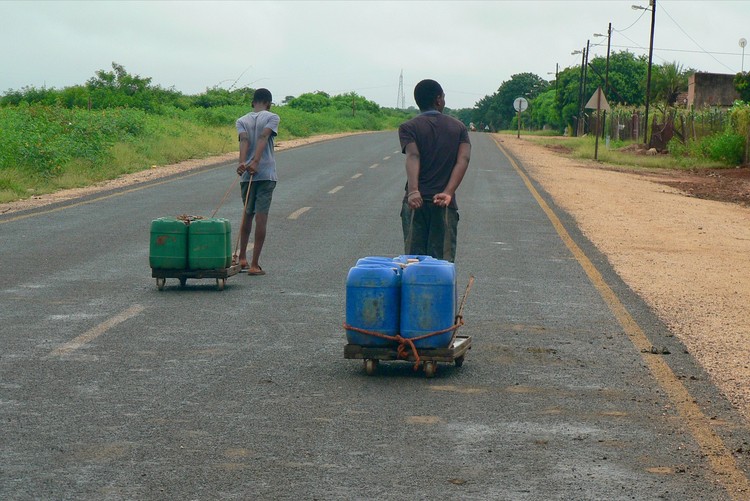School children in Vhembe wake up at 4:30am to fetch water
Water is not reaching households despite millions of rands spent on water projects
Learners in Mabilingwe village, Limpopo, wake up as early as 4.30am to fetch water before preparing for school. Photo: Bernard Chiguvare
Before going to school, learners wake up as early as 4:30am to fetch water in Mabilingwe village in north-east Limpopo. They pull up to six 25-litre containers on trolleys along the D3708 road to a borehole, a round trip of up to ten kilometres. Only then can they bath and prepare for school.
In 2021, the South African Human Rights Commission (SAHRC) reported how villagers, like those in Mabilingwe, were struggling to get water because various water projects were failing to deliver water in the Vhembe district.
The SAHRC revisited the area last month. “We are not happy about the situation,” said Victor Mavhidula, the commission’s Limpopo manager.
Millions have been spent on water projects by the national Department of Water and Sanitation. But because of Vhembe District Municipality’s dysfunctional reticulation systems, water is not reaching residents. Pumps and reservoirs are broken and deteriorating, said Mavhidula.
Mavhidula said the SAHRC may consider taking court action.
In its 2021 report, the SAHRC noted that the national Department of Water and Sanitation was failing in its oversight role and not intervening when municipalities failed to provide water, in contravention of the Water Services Act.
Department spokesperson Wisane Mavasa told GroundUp that it holds monthly meetings where municipalities report on the progress of their water projects, including challenges and solutions. There are also site inspections.
Grace Munisi, a mother of five in Mabilingwe village, said she has to make a 7km round trip every day to fetch water from a borehole, and one trip is insufficient. Alternatively, she has to buy water.
In Thulamela Local Municipality, families in the villages of Mukoma, Ha-Mutoti, Tshilungoma, Nweli, Tshotanini and Mphego experience prolonged water outages. Villagers said this is because the reservoir takes a long time to refill.
“Those who have taps at home installed them using their own money,” said Solomon Baloyi, chairperson of the Nandoni Complaints Resolution Committee, a community structure originally formed by residents who were relocated to make way for the construction of Nandoni dam.
Matsheka Maluta, an elderly resident, said the main water supply pipes leak.
In parts of Louis Trichardt town, taps were dry from 15 to 21 March. One of 18 food vendors with stalls near Shoprite said he needs 180 litres of water at a cost of R45 a day.
Vhembe District Municipality spokesperson Matodzi Ralushai has not responded to our questions for nearly two weeks, despite numerous follow-up attempts by GroundUp.
Support independent journalism
Donate using Payfast

Don't miss out on the latest news
We respect your privacy, and promise we won't spam you.
Next: Call for African Rainbow Minerals to stop selling coal to Israel
Previous: Alcohol industry used “regulatory capture” to delay liquor bill, say researchers
© 2025 GroundUp. This article is licensed under a Creative Commons Attribution-NoDerivatives 4.0 International License.
You may republish this article, so long as you credit the authors and GroundUp, and do not change the text. Please include a link back to the original article.
We put an invisible pixel in the article so that we can count traffic to republishers. All analytics tools are solely on our servers. We do not give our logs to any third party. Logs are deleted after two weeks. We do not use any IP address identifying information except to count regional traffic. We are solely interested in counting hits, not tracking users. If you republish, please do not delete the invisible pixel.

